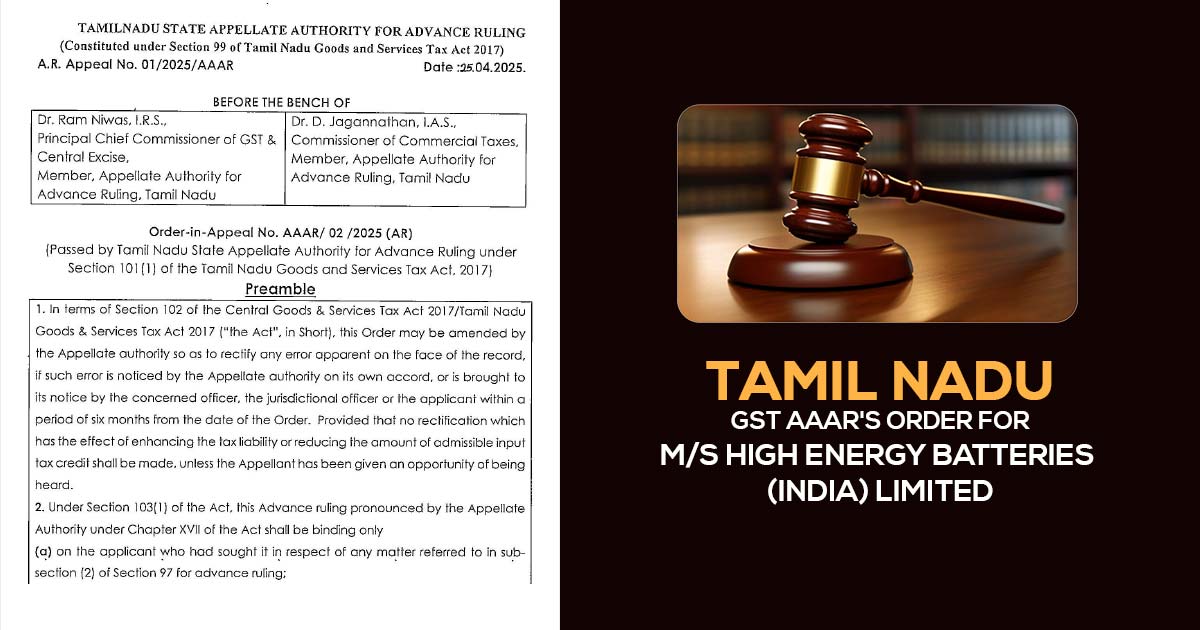
The decision of the Authority for Advance Ruling that Goods and Services Tax (GST) is applicable on the value of silver that is extracted from old or used batteries received free of cost from Indian Naval formations has been kept by the Tamil Nadu Appellate Authority for Advance Ruling (AAAR).
The silver extracted from the old batteries is thereafter repurposed to manufacture new batteries by the applicant.
High Energy Batteries (India) Limited, located in the Mathur Industrial Estate of Tamil Nadu, specialises in the manufacture of silver-oxide zinc batteries specifically designed for torpedo propulsion. The company plays a crucial role in supplying these advanced batteries to various Indian defence units.
An appellate application has been submitted by the High Energy following the ruling of the Advance Authority, where it was ruled that the value of silver supplied free by the Navy is accountable to be included in the taxable value of the new batteries manufactured and supplied via the company.
The appellant was represented at the hearing by a team that included M. Ignatius, the Director of Operations, R. Swaminathan, the Chief Financial Officer, and P.G. Srikanth, a Consultant. This representation took place during the personal hearing before the Appellate Authority on March 5, 2025.
Read Also: No GST ITC on Input Services Using Products’ Promotional Scheme: TN AAAR
In the hearing, the Director clarified that the silver utilised in production is sourced from decommissioned batteries, which are supplied at no charge by the Navy. The invoice value reflects only the costs associated with the extraction and processing of the silver.
As per the CFO, nearly 156 kg of silver is received via one such used battery, and the cost of extraction is ₹2,500 per kg. Appellant, the value of the free silver must not comprise part of the taxable value, as the cost agreed in the contract was the mere consideration receivable by High Energy from the Navy, and also because the raw materials (silver) were not sourced by High Energy themselves.
As per High Energy, even if the transaction were deemed as a job work arrangement u/s 143 of the CGST Act, their activity shall be entitled as a ‘manufacturing service’ under SAC 9988, drawing only 18% GST instead of 28%, as the activity shall be classifiable under the job work provisions instead supply of finished goods.
Recommended: Revised GST Slab Rates in India F.Y. 2025-26 by Council
The job work argument has been rejected by a two-member Bench comprising Dr. Ram Niwas, Principal Chief Commissioner of GST & Central Excise, and Dr. D. Jagannathan, Commissioner of Commercial Taxes.
As per the Bench, in the manufacturing process, silver is the primary raw material, and the supply of the same by the Navy constitutes a non-monetary consideration u/s 2(31) of the CGST Act, 2017.
The supply of used batteries via the recipient must be charged with tax u/s 15(2)(b) of the CGST Act, as it contributes directly to the value of the finished goods. AAAR, only entering into a contract excluding the value of free-supplied goods could not override the operation of Section 15(2)(b).
The claim of the appellant has been dismissed by the authority, which relies on CBIC Circular No. 47/21/2018-GST, citing that it relates to the moulds and dies merely and is not applicable in the same case as silver is not a capital good, though an integral consumable input in this.
The appeal has been dismissed by AAAR, concluding that the manufacturing activity performed by the appellant is not entitled as job work u/s 143 of the CGST Act, and that GST is applicable on the whole taxable value of the batteries supplied, along with the value of the silver received free of cost from the Navy.
| Case Title | M/S High Energy Batteries (India) Limited |
| GSTIN | 33AAACH1479H1ZR |
| Appeal No. | AAAR/02/2025 (AR) |
| Represented by | Shri. M Ignatius, Shri R.Swaminathan, Shri P.G. Srikanth |
| Tamil Nadu GST AAAR | Read Order |









